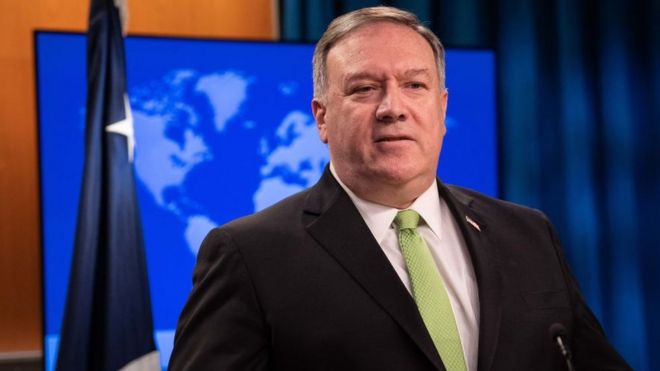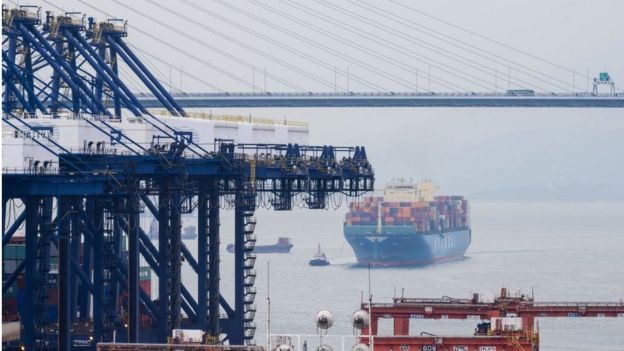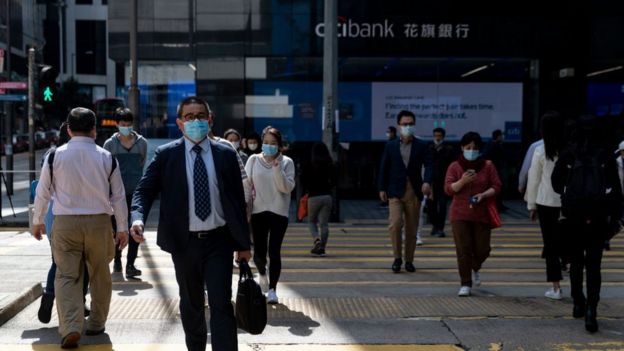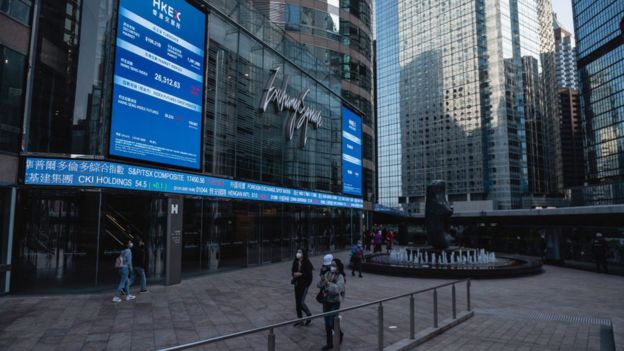 GETTY IMAGES
GETTY IMAGES
Top members of the US administration have warned that Hong Kong no longer merits a special status when it comes trade, and the territory could be treated the same way as mainland China.
Until now, the US has given Hong Kong favourable trading terms, dating back to the territory's time as a British colony, but US Secretary of State Mike Pompeo told Congress that Hong Kong no longer enjoys a high degree of autonomy from China.
Meanwhile, President Donald Trump's top economic adviser Larry Kudlow said Beijing "will be held accountable" for a new security law set to be imposed on Hong Kong.
The National Economic Council Director told CNBC, "If need be, Hong Kong now may have to be treated the same way as China is treated, and that has implications for tariffs".
So what will it mean if that special status is revoked?
Hong Kong is well-known as one of the world's most important financial centres. With a free economy and a competitive tax regime, it's attracted many multinational companies to its shores.
It's also an important hub for trade. But all of that could be in jeopardy, if the US changes the way it deals with Hong Kong.
So what is the US threatening?
At the moment, Hong Kong enjoys special trade relations with the US. It operates as a separate customs territory to mainland China. It also has a free port, meaning no tariffs are charged on the import or export of goods.
Those arrangements have helped Hong Kong become a centre for global trade. But now the US is threatening to treat Hong Kong the same as mainland China. That would mean its goods would be subject to additional tariffs, including those extra charges that were introduced as part of the US-China trade war, although some of those have recently been rolled back.
 GETTY IMAGES
GETTY IMAGES
"Hong Kong has had a special trading relationship with different types of tariffs and regulations that have allowed it to trade in a freer way, particularly in relation to capital markets," said Dr Rebecca Harding, independent trade expert and CEO of Coriolis Technologies.
"The US has treated it as an ally, if you like. But it's now saying we are going to treat you in a similar way to how we treat China," she said.
Where does that leave Hong Kong?
Hong Kong is one of the world's top trading territories. In 2018 it was ranked with the 7th highest volume of trade with a total value of nearly $1.2tn.
But much of that trade is made up of goods that pass into, or come out of, mainland China.
In 2018, 8% of mainland China's exports to the US and 6% of mainland China's imports from the US, passed through Hong Kong.
This role as a gateway between the Chinese market and the rest of the world has put Hong Kong in a unique position, but different trade arrangements could change that.
 GETTY IMAGES
GETTY IMAGES
"If there's a new trade regime in place, that changes the calculation for companies," said Dr Tim Summers, a Senior Fellow at Chatham House, based in Hong Kong.
Companies could choose to move their goods directly through ports in mainland China instead, and higher tariffs there will mean higher price tags.
"The people who are going to get hurt are businesses and consumers," Dr Summers said.
Will China be worried?
Not so much as it might have been at the time of the Hong Kong handover. Back in 1997, Hong Kong played a much more significant role in China's economy, accounting for around 18% of China's GDP.
"But over the last 25 years China has grown massively," said Dr Summers. Hong Kong now contributes just 2-3% of China's GDP.
"Put that in context of the ocean of trade coming out of China, it's not so significant any more. So if President Trump were to act on trade, Hong Kong would suffer, but it's not a gamechanger for China," he said.
 GETTY IMAGES
GETTY IMAGES
Beijing will however want to maintain Hong Kong's status as a global financial centre. Mainland Chinese companies are among those which choose to list on Hong Kong's Stock Exchange because of its access to global capital. Mainland Chinese companies also benefit from Hong Kong's large financial services sector.
"Shanghai and Shenzhen already have a vibrant financial services sector serving mainlanders," said David Webb, a former investment banker who's lived in Hong Kong since 1991. But so long as Beijing has capital controls on the movement of money in and out of China for investment, "then it can't compete with Hong Kong on international capital," he said.
How could this affect the US?
Each year, billions of dollars worth of goods and services are traded between Hong Kong and the US. In 2018, the total value of that trade was almost $67bn according to the US Trade Representative, including $17bn worth of imports that Americans bought from Hong Kong.
If Hong Kong faces the same trading terms as mainland China, US consumers will pay more for those goods.
"American businesses both in the US itself and in Hong Kong are lobbying hard to try and get any action diluted," said Rachel Cartland, director of Cartland Consulting and a former Hong Kong civil servant.
The US Chamber of Commerce has warned that far-reaching changes to Hong Kong's status would have "serious implications" for Hong Kong and US businesses.
That puts Washington in a tricky position, according Dr Summers.
He says ostensibly, Secretary Pompeo's threat appears to be about recent developments in Hong Kong, and Beijing's new security law for the territory. But he said, what it's really about is US-China relations.
"If I were going to be really cynical, I would say this has provided an opportunity for some people in Washington to take measures they wanted to take anyway against China, in the context of a wider US-China rivalry," he said.
"That may well drive the thinking of what Trump does next more than any particular concern about the political autonomy of Hong Kong," he said.

No comments:
Post a Comment